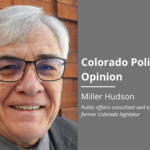Sins of omission in Laffer’s Prop HH perspective | SLOAN


As I undertake the exceedingly bold and presumptuous exercise of correcting one of my economic heroes, Dr. Art Laffer, I am reminded of how my journalistic hero, William F. Buckley jr., started off his famous debate with my political hero, Ronald Reagan, in 1979 over the Panama Canal treaty. Said Mr. Buckley, “If Lloyd’s of London had been asked to give odds that I would be disagreeing with Ronald Reagan on a matter of public policy, I doubt they could have flogged a quotation out of their swingingest betting man; because judging from Mr. Reagan’s impeccable record, the statisticians would have reasoned that it was inconceivable that he should make a mistake.” My sentiments exactly, if expressed more eloquently.
Nevertheless, as inconceivable as it is, the idiomatic godfather of supply-side economics did in fact make a mistake as he debated in favor – yes, in favor – of Proposition HH last week. The architect of Reaganomics paired up with his old pal Gov. Jared Polis against Advance Colorado’s Michael Fields and the esteemed conservative Assistant House Minority Leader Rose Pugliese on a debate on the measure.
Stay up to speed: Sign-up for daily opinion in your inbox Monday-Friday
It’s worth noting Dr. Laffer’s sins in this exchange were ones of omission. What he said, for the most part, was very true. He said, for instance, what he has always said, an economic truism: low levels of taxation are an overall economic benefit. His crowning contribution to economics is the Laffer curve, which informs us increases in marginal tax rates on a progressive curve in fact diminish, not increase, government revenues. The corollary is reducing the tax burden stimulates productivity, and therefore economic growth, derivatively increasing revenue. He further said Colorado’s (relative) prosperity and economic growth is a direct result of it’s (relatively) low tax burden.
Professor Laffer is absolutely correct on all those points. I do not disagree one iota. No sound economist to the right of Elizabeth Warren or Jeremy Corbyn disagrees. Neither Mr. Fields nor Ms. Pugliese disagree. Even Gov. Polis agrees.
The trouble is that has diddly squat to do with Proposition HH.
Consider Prof. Laffer’s position (which happens to be mine) that reducing tax rates, i.e. allowing people to keep more of their money, stimulates growth and ultimately increases revenue – that tax rate cuts pay for themselves. Proposition HH specifically counters that argument by marrying the property tax rate reductions to TABOR. The essence of HH, the very reason it requires voter approval, is its proponents don’t believe they will pay for themselves, and therefore they have to be offset – in this case, by a completely separate pool of revenue. HH purports to “pay for” those rate reductions by lifting the state’s spending cap, i.e., increasing the amount of money the state government is allowed to keep from income tax. That is the crowning achievement of HH, not the temporary property tax rate reductions – which, in any case, amount only to a reduction in the inherent and dramatic increase in property taxes resulting from the repeal of Gallagher, and which, according to the Common Sense Institute, will still allow property taxes to increase above their historic growth rate.
Consider a parallel; imagine Mr. Reagan reduced the income tax rate, but “paid for it” by increasing death taxes and capital gains tax. What Mr. Laffer is, perhaps inadvertently, advocating for is precisely the same thing – a slight reduction on the increase of one kind of wealth tax, in exchange for the government retaining, rather than refunding, the excess income tax paid to it.
Laffer also said, several times, Colorado’s success is due to, not in spite of, low tax rates and “close control of your taxes.” Where does he think those low rates and “close controls” come from? That’s right, the TABOR amendment, and both it’s plebiscitary and spending limit provisions which he seemed to so blithely dismiss.
Now, Mr. Laffer was on to something when he said rather than refunding the excess, it would be better for taxpayers to keep the money in the first place. Perhaps he can convince Gov. Polis to champion a bill to adjust TABOR to trigger automatic income tax rate reductions in the event of a surplus. I’ll bet Rep. Pugliese would even co-sponsor it. I wager she would do the same with an income tax reduction bill, if only the governor could whip up 20 votes among his own party. The sleight-of-hand required to move Dr. Laffer off of strict adherence to the economic truism that bears his name deserves a measure of political admiration, and suggests the governor ought to be able to pull it off.
Kelly Sloan is a political and public affairs consultant and a recovering journalist based in Denver.












